distrust everything if you have to. but trust the hours. haven’t they carried you everywhere, up to now?
it’s the dream of all poems, and the text of all loves: Tenderness toward Existence.
dear little voice,
it’s the dream of all poems, and the text of all loves: Tenderness toward Existence, Galway Kinnell writes in Dear Stranger Extant in Memory by the Blue Juniata.
tenderness, i am beginning to learn, is a sort of genius.
that is to say, it is a sort of touch; a touch that can be given just as easily as it can be learned.
we do not choose our genius in this life— it chooses us in a divine arbitration that seemingly defies our control. profound love, passion, those revelations that cleave the darkness — these gifts fall to us with the calculation of sun on water. in our confusion we have, over time, bestowed upon the most enviable of these unsummoned marvels a little moniker — genius.
we borrow this word genius from the Latin spiritus, suggesting not only that little flutter inside of us— the one treasure we carry through the terrifying door away from this life of tabletops and shoelaces and into somewhere else longer, golder, more infinite— but also the very material of our ongoing exchange with the world around us.
each day, you will breathe, on average, 22,000 times. much like most things that are obvious and given, this is also miraculous.
but that scent of buds is not released at random or to please you alone. neither is the buttery fragrance of summer— its white skies and silence— or the feverish aroma of the sea being pulled in from the shore, of the sharp tang of lightning, heady and distant, as though sealed in a bottle; the air of long-remembered lunches with tomatoes, basil, butter and wine— the sea distant, the trees green—that still shelter you in their memory like a tent.
the genius of the air is that it conspires to make itself more beautiful, more tender, so that you might just let more of it in.
it does this because you— little you, kicking stones and watching television—- are a site of tremendous transformation.
it is a delicate exchange, and the one you do the most often— whether with a subtle parting of the lips, the invisible shudder of tears, or a delighted tug of awe— in which you breathe with the lungs of all things. air, this invisible material of life, reaches you slowly— as poetry does, or roses, or dust— and murmurs softly to everything inside of you: you, who draw in the air of mothers standing in doorways taking the coat of a son’s lover, of tigers and grizzly bears, old men driving and planting tomatoes, of a spider living by a stove, the hands behind the heads of babies, of people sitting beside people under trees, trees under clouds, clouds under sun, sun under whatever sun is under— and, with the most subtle of sighs, release back to them the life which they have, for a moment, loaned across infinite distances.
this is a dance speaking intimately to you, even though it has been constructed to speak intimately to thousands of others also. a crowd, little voice, is an illusion— no such thing exists. you are always speaking with the world personally. you are drawing it inside of you 22,000 times a day and releasing it to compose the world’s next wobbly step— a baby’s first cry, the first crack in an egg, a dragonfly.
we may not be commanders of this place we are in, but we are also not its subjects. we are a partner in this vast and inscrutable domain.
it’s the dream of all poems, and the text of all loves: Tenderness toward Existence.
The respiratory system within the lungs, illustrated here by a model made from a resin cast- Science Source/Science Photo Library
breathing strikes me as being very similar to waiting, in it requiring a quiet kind of genius.
that is, it often requires a considerable amount of thought before you realise it is important, and with this understanding it suddenly becomes an unseemly burden.
we are, by design, not waiting creatures. to observe people waiting is to observe a circus of motion: some remain anchored in their post, whilst others sketch the floor with the angle of a toe in silence; coins dance quietly in pockets, eyes sweep walls and ceilings.
as the quiet lengthens, so does the tension of the unspoken dramas playing out within the privacy of our minds—in part because we simply believe we are entitled to have finished waiting by now.
and this urgency is not without reason; it is the result of the inherent difficulty of leading an ordinary life. our existence is predicated on movement, on our relentless search— both as a species and as little voices— forward through time and space. and so we move, driven by the unspoken belief that somewhere along this journey lies the object of our waiting.
perhaps what is most interesting about this whole dance is that rarely do we know what it is, exactly, that we are waiting for at all.
so time passes. we grow old. worry stitches our faces into baffled lines. we are tired.
you’re tired. but everyone’s tired.
but no one is tired enough.
only wait a little and listen.
V Martineau, human Respiratory Systems in exchange of 02 and C02.
“speed is the form of ecstasy the technical revolution has bestowed on man,” Milan Kundera wrote. this is our very fabric of our condition: for all our evolution and advancement, we simply cannot keep up with ourselves.
consider the particle physicists, alone in their coats splitting seconds apart at their seams at the rate of chopping carrots: these modern alchemists who claim the ability to arrest time itself, dissecting it with the detached precision of a surgeon making the first incision. but away from the sterile confines of laboratories, in the messy and untameable reality we inhabit, events unfold at speeds that defy our mind's capacity for discernment: a stone is skimmed across a pond, a beautiful stranger meets our glance, the smell of the clothing of our childhood suddenly vanishes from our walk home just as soon as it stopped us in our steps— the past and the future blur into a continuum, as indistinguishable as they are intertwined. what significance, then, does a nanosecond hold for us little creatures, when we are standing here overwhelmed and oblivious?
whilst waiting is a state of vague dreaminess, never deep or intense, but instead simply observant— impatience is closed, serious, and painfully interiorised. you can be waiting playfully anywhere, but impatience grows with the demand of a bone, isolating a little voice in the impenetrable noise of not-having.
this is why Tenderness towards Existence exists in a time immune to the exhaustion of our impatient days; it exists in slow time, at the pace of gazelles’ sleep and figs’ ripening. it is the pace of sand loosening into surf. the sinking softly of the weight of hours. it’s the aroma of coffee, the whiteness of sunlight across the floor. it’s nine kisses on the nose and the sound of goodnight. the float of joy, fields tolling bellflowers, the insides of silence, warm and enveloping. it’s the sudden, dazed spark of safety. cathedral evenings. rice on steeples. the quiet of stones. stars plunging to the earth and the children of swans on water.
it’s why, little voice, when i am overwhelmed and oblivious and need a little genius to get me going— to breathe a little — i turn to the dream of all poems, and the text of all loves: Tenderness toward Existence.
“It’s not that I’m unaware of the suffering and soon-to-be-more suffering in the world...it’s that I know the suffering exists beside wet grass and a bright blue sky recently scrubbed by rain. The beauty and the suffering are equally true... (I need to) see it all and hold it for as long as I can.”
- Ann Pratchett, Tom Lake
most often, i find this Tenderness tucked in a poem: the luminous silhouette of someone who once decided that life is important enough to stand up and say, with as little concealment as possible: this is what it means for me to be on earth, here, at this moment.
much like breathing is only a function of the body’s machinery until you recognise its insistent magic, a poem is only a series of scattered words until you put your ear down hard and hot to it and listen.
in other words— the pace of our lives demands a certain tenderness: a tenderness that exists in slow time— a time measured not by the clock, but by the moments spent with a hand in another’s, or bent over a flower simply more curious than the rest, or in the instant between laughter and breath.
and much like a poem is only words at random to an untender eye, waiting— as represented by silences, gaps, and distance—is not an idle passage of time, but a space blooming with the yet-to-be: a space where the contours of the known world blur, where we can imagine that which does not yet exist, and begin to carve the delicate paths into new worlds.
Artist unknown.
in Jason Farman’s love letter to bank teller queues and toe tapping (Delayed Response: The Art of Waiting from the Ancient to the Instant World), he draws on Samuel Beckett’s classic play Waiting for Godot:
“Beckett’s play, in its many violations of theatrical norms, strips away plot expectations to make a comment on the human condition. Godot symbolizes whatever we wait for, whatever we long for, whatever we rely on to save us from our current state of uncertainty and despair. Godot represents the promise of what might come on the other side of our waiting…
It shows how time flows through us and changes us. Day after day, as we wait for the things we desire, we become different people. In the act of waiting, we become who we are. Waiting points to our desires and hopes for the future; and while that future may never arrive and our hopes may never be fulfilled, the act of reflecting on waiting teaches us about ourselves. The meaning of life isn’t deferred until that thing we hope for arrives; instead, in the moment of waiting, meaning is located in our ability to recognise the ways that such hopes define us.”
galway’s poem is beautiful because it is simple. it does not promise anything, and it asks even less— it makes of you but one meagre request: please, wait.
it was after the long distance telephone call in which, out of necessity, i fractured my own heart— it was not, i realised, in retrospect, a clean break— transmitted from the St Kilda Bay to the porch in Seattle, Washington, that i understood this. as I sat sockless and eating an orange by hand in the mid-winter frost, in the silence of the well-anticipated haze that so frequently follows heartache, i knew that i was going to need some very simple and very explicit instructions should i want to succeed in rescuing myself. so, i gave myself permission to ask of myself only one thing.
after some time, i decided. i picked up my notebook and wrote:
i am only asking you to be brave.
i am only asking you to be brave.
i am only asking you to be brave.
we rattle our little hearts struggling against the clock. we ask ourselves: “how can I move faster, and do more and more things in less and less time?” we toe-tap our way through discomfort, huff into the blathering of our discontent, and tug at the shirtsleeves of our distress.
we want what we do not know, but that which we know will make us not need to wait anymore, and we want it now. we want the new love, the new home, the one with daisy striped wallpapers and always-clean sheets, the perfect sentence, the hushed devotion of a room. we want awe, we want it now, we want melancholy and we want romance, we want to speak like DH Lawrence, we have no time for hair to become interesting, for pain to become interesting, for buds to become interesting— and so we grow tired; tired aching for something to extend itself like a hand, for a lap in which to nuzzle, for a match struck in the dark—aching to depart this dusty house of longing and for something new and marvellous to burn its luminous outline into our lives. and we want it without waiting. we ache for it now.
we do not perceive our waiting days, as TS Eliot termed them, the still point of the turning world:
“At the still point of the turning world. Neither flesh nor fleshless;
Neither from nor towards; at the still point, there the dance is,
But neither arrest nor movement.”
Selene, by Albert Aublet— a painting which to me has always felt like the first tremor of a conscious breath.
to insist upon a Tenderness toward Existence is to walk barefoot— it is to be forever open and receptive to the everyday genius of simply milling about on this little earth, awake to the very miracle of your exchange-in-perpetuity with the world: you, who will come and go from the world at the rate of a flare of light, and yet whom 22,000 times a day composes the very fabric of flowers, doves, soil, goldfish and stones.
it is to insist that this time spent waiting is as vast and important of an act of creation as receiving is.
As
writes in :Cheryl Strayd, Dear Sugar
things happen and we are changed by them, as we are by each other. sometimes, these things are beautiful and immediate. at other times, these things that happen are not fair, and take time to reveal their importance. always: the moon rises, always: the sun follows, always: we continue to become what we are.
i can assure you of one thing, little voice, and it is this: something is waiting for you.
though what it is, i cannot tell you.
i can only tell you that it begins as soon as you stop rushing through your own soul.
“Whatever happens. Whatever what is is is what I want. Only that. But that.”
- Galway Kinnell, Prayer
maybe in his poem Wait, galways kinnell is speaking precisely to this Tenderness toward Existence; telling us that in waiting there can be a kind of life too, that in receiving we actually experience a kind of death of this mystical waiting-state ripe only with possibility, and devoid of the closed-off certainty of knowing. this is, of course, a realisation that takes a great deal of bravery. it is a claim on existence: waiting is not necessarily a state contingent upon receiving, but instead its own vast and imaginative place of possibility. it is not a turning from, or towards— but a turning into.
i am only asking you to be brave.
Galway Kinnell reads his poem Wait.
one of the most wonderful discoveries of my life is that its mystery is always available to me.
so wait.
don’t go too early.
you’re tired.
but everyone’s tired. but no one is tired enough.
only wait a while and listen.
so if you must wait, let it be a pure, barefoot, blue-coloured kind of waiting— a waiting with daisies, fierce with blossoming, born of itself and stepped into with a Tenderness toward Existence.
and if there is to be another you, let it be the form of you in this waiting— your reflection, turning not toward or from, but into what you are.
this is, after all, the dream of all poems.
why should it not be yours, too?
love,
ars poetica.
little voice: it is my belief that Poetry is a human birthright. it is for this reason that my work will always be completely free, but it takes considerable Time and Love to give to you each week. if it has brought you something, please consider buying me a book so that I may continue to tuck Words in your pocket:
“We don’t know what life is, but we know all who live on earth eat, sleep, mate, work shit, and die. Let us remember this is our home and that we have become, we mad ones, its keepers. Let us sit bent forward slightly, and be opened a moment, as earth’s holy matter passes through us.”
—Galway Kinnell, closing lines to “Holy Shit” from Imperfect Thirst


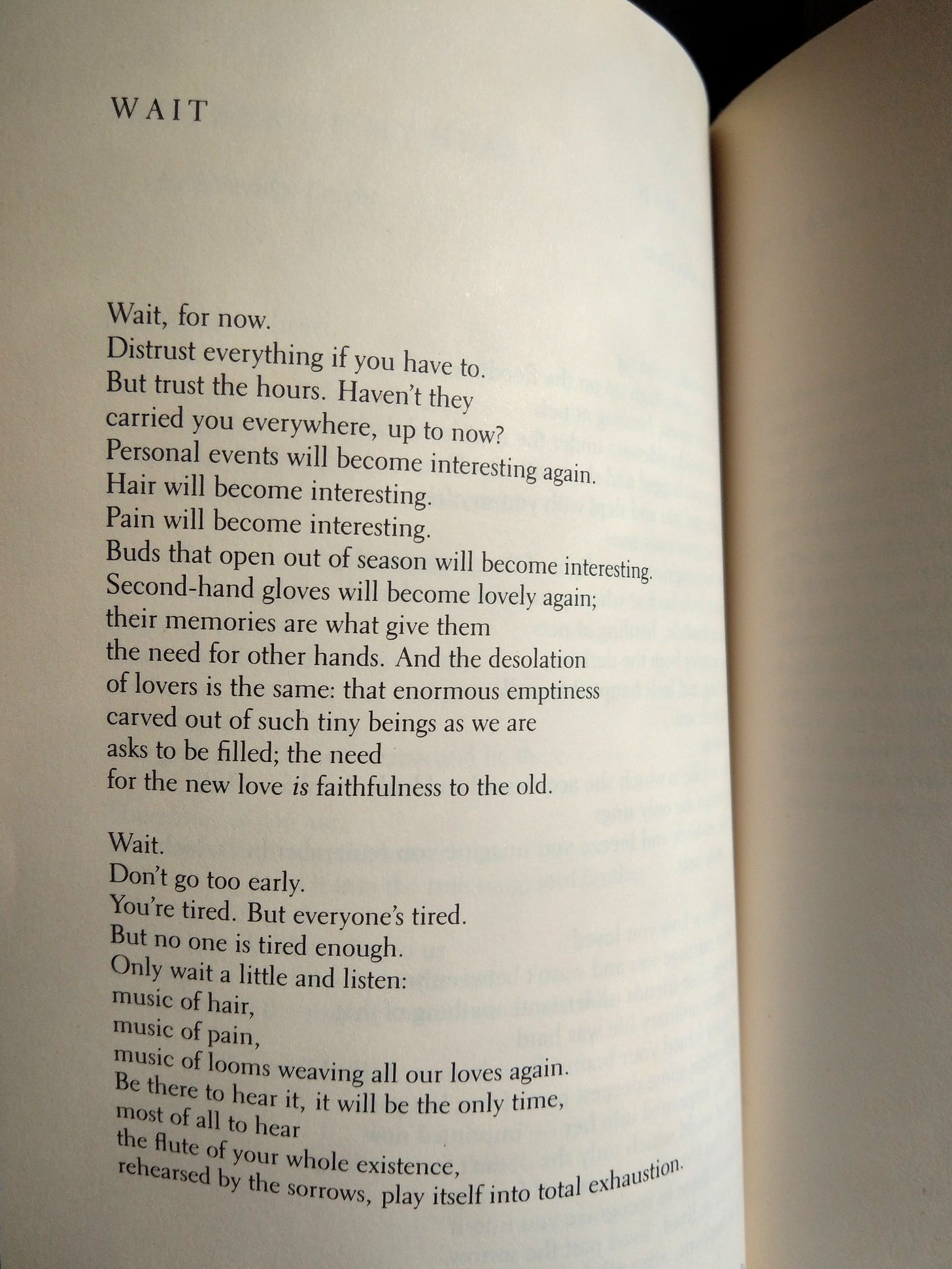

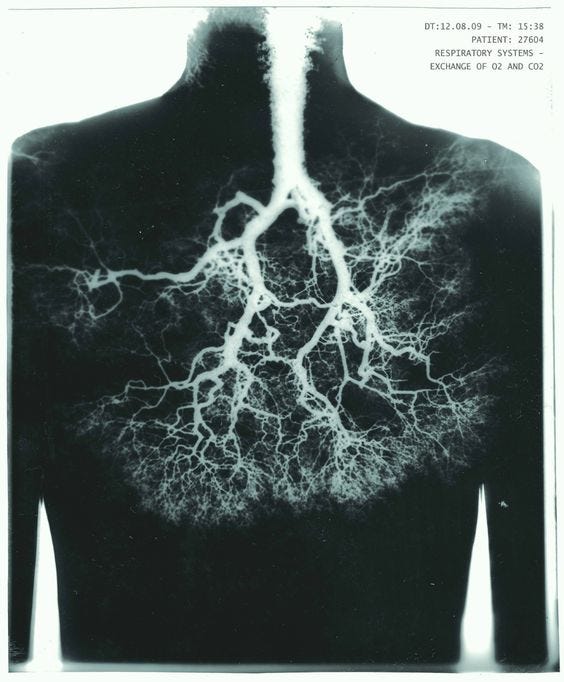
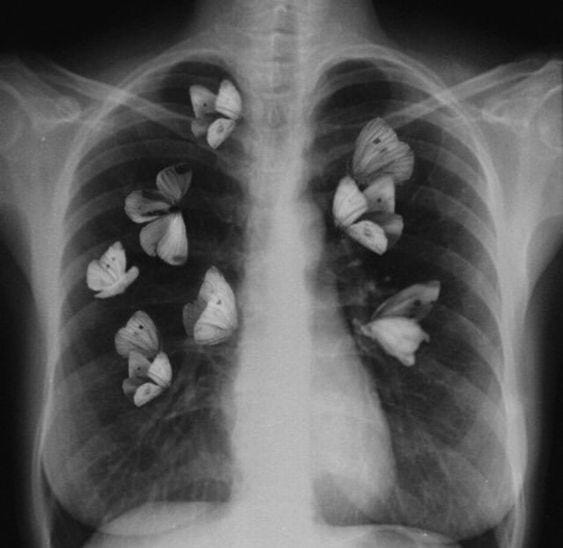
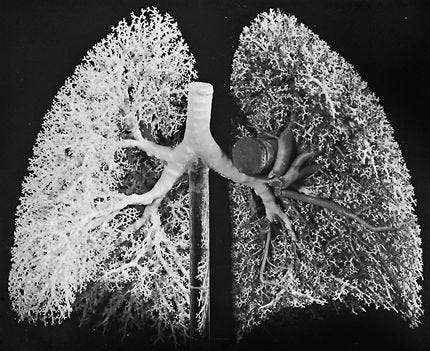
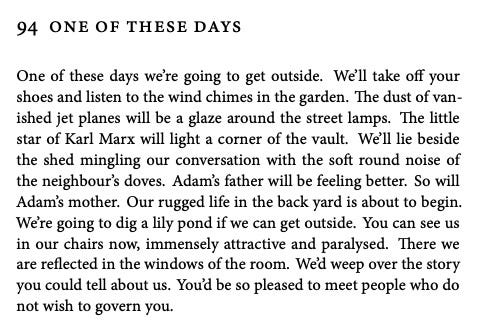
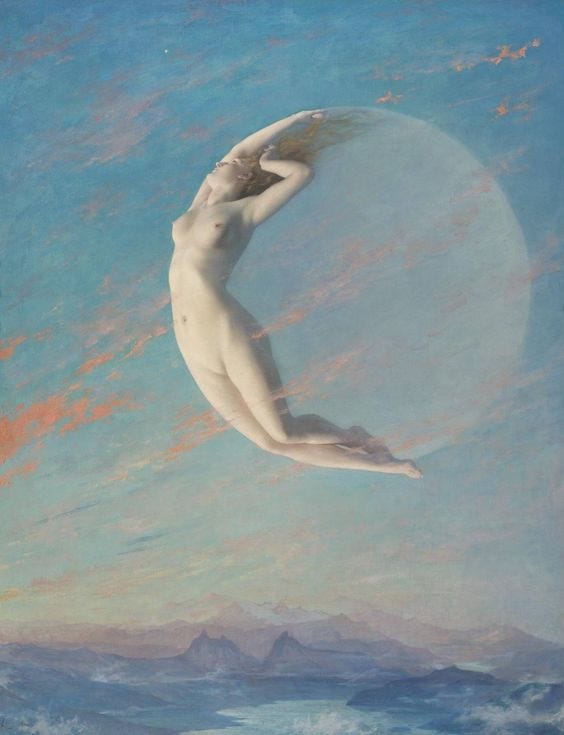

Let time
Soften the calluses
On your fingers
So you may
Touch with tenderness
That tenderness
Of existence.
I always feel so happy when I see your letter waiting in my inbox. Often I save it to read at a quiet time when I have space to ponder its truth and beauty. Such gorgeous painted layers of thought and emotion-- thank you for sharing your gifts.